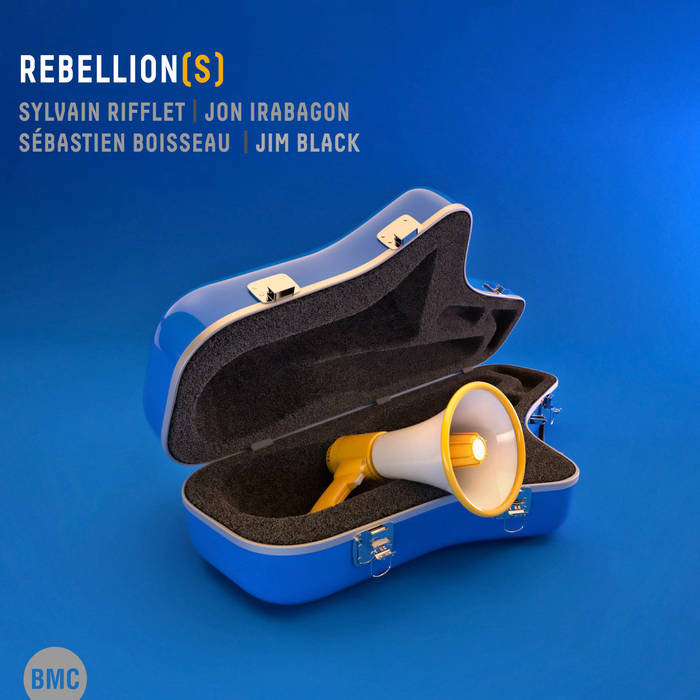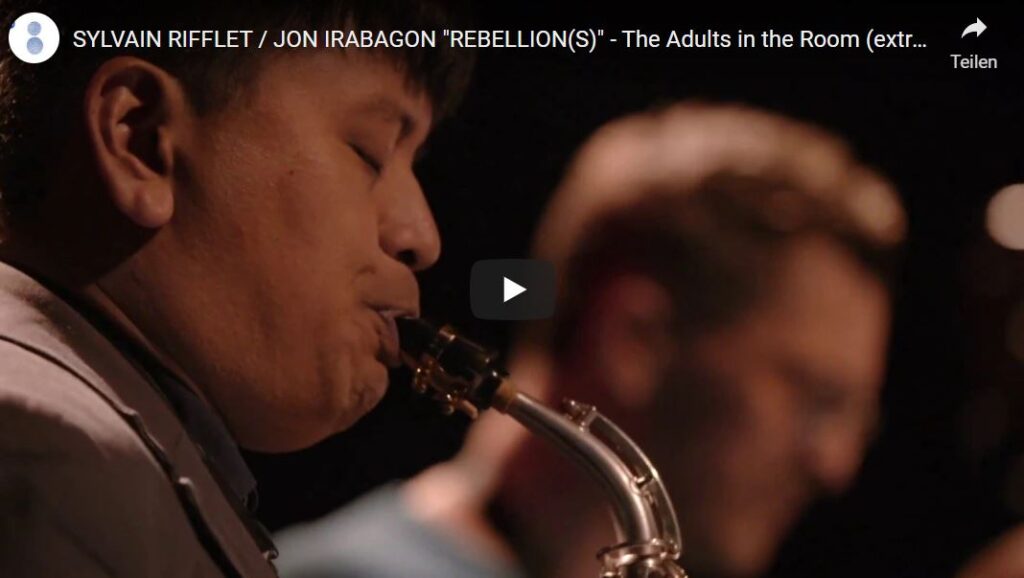Sylvain Rifflet – We want Stars
Sylvain Rifflet – We want Stars
faszinierend, enthusiastisch, inspirierend
Released September 13, 2024
Sylvain Rifflet – tenor saxophone
Bettina Kee – Piano
Vinvcent Taeger – Drums

SYLVAIN RIFFLET
Das Konzept: ein Trio mit Synthesizern. Hier: Saxophon, Synthesizer und Schlagzeug. Sylvain Rifflet sagt es auf seiner Website so: Hier besteht das einzige Konzept darin, dass es ein Trio mit Synthesizern ist. Ich kann keine Musik in der Abstraktion schreiben. Ich kann kein Stück schreiben, bei dem ich mir sage: „Ich werde sehen, mit wem ich es spiele“. Wenn ich für Alphabet, Mechanics, Troubadours oder Aux anges schreibe, bitte ich Benjamin Flament, mir den Zustand seines Sets (das sich ständig verändert) aufzunehmen, und gehe dann von den Klängen aus. Hier habe ich genau das Gleiche gemacht, aber mit Synthesizern. Ich habe mir zwei Synthesizer und Soundbänke gekauft, die mir von anderen empfohlen wurden, und dann habe ich herumprobiert, Sounds ausgewählt und daraus komponiert. Unser Klang bedingt, was wir tun, und insbesondere im Tenor, denn das ist eines der Instrumente, die den größten Spielraum haben. Zwischen Albert Ayler und Stan Getz liegen Welten, und dazwischen gibt es Milliarden von Variationen. Mein Saxophonlehrer Michel Goldberg sagte immer zu mir: „Ideen rollen über den Klang“. Ich fand das damals total seltsam, aber heute ist es wahrer denn je. Das gilt nicht nur, wenn ich mein Instrument spiele, sondern auch, wenn ich schreibe. Wenn ich von den Klängen ausgehe, kommen die Offensichtlichkeiten viel schneller.
Herausgekommen ist eine rhythmisch aufregende Arbeit mit interessanten Wendungen, zwischen den Zeilen, über den Zeilen in den Zeilen – besonders Mǎmǎhūhū hat es mir angetan – eigentlich eine Fingerübung, entwickelt das Stück eine eigene Dynamik, die gesteuert vom Basslauf auf den Keyboards und dem intensiven Drive des Schlagzeugs aufdreht bis zum freien Spiel über etwaigen Hamonika-Geräuschen hinaus. Auch Labyrinth ist ein Hammer mit Knoten, ein dickes Ding. Den unglaublichen Groove verdankt die Aufnahme Vincent Taeger an den Drums, wie Sylvain Rifflet im Interview zu verstehen gibt im Zusammenspiel mit Bettina Kee am Synthesizer. Bettina hatte vor langer Zeit mit Emiliano Turi und Jean-Philippe Morel dieses Trio MOP gemacht, das superschön war. Es war Zwölftonmusik, wie das, was sie hier manchmal spielt. Ich dachte mir, dass das etwas Abwechslung bringen würde. Ich wollte keinen sauberen Jazz. Bettina war die richtige Person. Und außerdem kennt sie Vincent sehr gut, sie haben schon früher zusammengearbeitet.
Die Titel der Stücke scheinen ganz bestimmte Geschichten zu erzählen… Worauf beziehen sie sich?
Es ist selten, dass die Titel die Musik inspirieren; normalerweise setze ich Titel auf bereits geschriebene Stücke. Einige beziehen sich auf persönliche Erfahrungen. Ich war Best Man bei der Hochzeit des Saxophonisten Jon Irabagon, und „First Dance“ bezieht sich auf den stark ritualisierten ersten Tanz bei amerikanischen Hochzeiten. Als Kind habe ich ein Jahr lang in China gelebt, und „Mamahuhu“ ist ein mandarinischer Ausdruck. Wörtlich übersetzt bedeutet es „Pferd Pferd Tiger Tiger“, und es bedeutet „wie dies und das“. In anderen Titeln geht es mehr um die Musik. Während des Lockdowns habe ich wieder mit Bach angefangen, und „Boom“ kommt daher, dass wir Vincent „Vince Boom“ nannten, also beginnt „Bach and Boom“ wie ein etwas seltsames, falsches Bach-Präludium und endet mit einem Schlagzeugsolo. „Labyrinth“ beschreibt die Form des Songs. Außerdem sind einige Titel mit einem Augenzwinkern versehen. „We Want Stars… Not Satellites“ ist eine Schande für Elon Musk, der so viele Satelliten in den Himmel schickt, dass wir am Ende die Sterne nicht mehr sehen können. Das letzte Stück ist eine Hommage an John Surman, der viele Platten mit Synthesizern gemacht hat, vor allem als Solokünstler, und der eine ganz besondere Art hat, Arpeggiatoren zu benutzen, von der ich mich inspirieren ließ.
Nachzulesen auf seiner Website (in französisch).
Apropos: wer es übersehen hat: du hast noch weitere Aufnahmen mit Synthesizer – Space-Musik für Techno-Affine wie Nachtlebendige – alles geht immer so schnell, zu schnell, die Aufnahmen waren dann auch wieder da – und weg. Siehe auch die hervorragende Rebellions aus 2020.

von SYLVAIN RIFFLET
Sylvain Rifflet : Saxophone, clarinet & fx
Philippe Gordiani : Electronics
Guests :
Bettina Kee a.k.a Ornette : Voice (Song 1.1 & Song 1.2)
Thomas de Pourquery : Voice (Song 1.1 & Song 1.2)

von Sylvain Rifflet with Verneri Pohjola
Sylvain Rifflet – Rebellions
Released November 18, 2020
Sylvain Rifflet – tenor saxophone
Jon Irabagon – mezzo-soprano and sopranino saxophone
Sébastien Boisseau – double bass
Jim Black – drums

Ein Cover, eine Aussage: Ein Megaphon für die brennenden Fragen des Alltags. Es finden sich gleich zwei Saxophonisten als Megaphonisten, nimmst du noch Sébastien Boisseau am Bass und Jim Black am Schlagzeug, bist du der Rebellion sehr nah. Das Wort vom Widerstand geht um und steht sinnbildlich für eine Diversität der Sprachen zu unterschiedlichen Zeiten. Es wird politisch, wenn „die feurigen Worte“ von André Malraux (französischer Schriftsteller) von Emma Gonzalès, Olympe de Gouges und Paul Robeson in die Waagschale geworfen werden und durchschütteln oder aufrütteln wie John Coltrane, Sun Ra, oder Ornette Coleman.
“Es werden Konventionen durchbrochen”, sagt Sylvain Rifflet, einer der Architekten dieses Rebellion-Projekts. Er legt großen Wert darauf, sich erst im Kopf klar zu machen, was schließlich Musik wird. Der sprichwörtliche Anfang vom im Anfang war das Wort. Dieses Projekt versucht aus der Tradition des American Jazz heraus all die Stimmen, Worte, die Sprache der charismatischen Revolutionäre und Aktivisten zu deuten und in seiner Vielfalt zu zeigen. (Mit Megaphon)
Zitat: „Mit Phrasen des gesprochenen Wortes, die den gesungenen Gesangsteil ersetzen. Diese beeindruckenden Reden sind Katalysatoren für die Kompositionen, nicht nur inhaltlich, sondern auch musikalisch: Die Rhythmusgruppe mit zwei Schlüsselfiguren des amerikanischen und französischen Jazz – dem Schlagzeuger Jim Black und dem Bassisten Sébastien Boisseau – erweitert mit ihrem Spiel die Dynamik der gesprochenen Sprache, während die beiden Melodie-Instrumentalisten die Musikalität der Sätze aufgreifen und weiter verweben.
Währenddessen hört man in der Musik die kochende Leidenschaft großer Vorgänger wie John Coltrane, Sun Ra oder Ornette Coleman. Das Ergebnis ist Free Jazz, eine komplexe Legierung aus repetitiver und minimaler Musik, die hier direkt die emotional-intellektuellen Kanäle des Zuhörers anspricht.“
Frei gesetzt werden Worte, Phrasen, Ambitionen und Gefühle – zusammengeschnürt zu einem expressiven und anspruchsvollen wie virtuosen Wechselspiel vier Gleichberechtigter.
Sylvain Rifflet – We want Stars 2024
Referenzen
Website Sylvain Rifflet – Wikipedia | Deutschlandfunk : „Rifflet findet die Komplexität in der Einfachheit und baut auf Texturen auf, die sich auch in der elektronischen Musik und in der frühen Minimal Music finden lassen.“ | Karl Lippegaus: Portrait (Podcast) | Label : bmcrecords.hu | Sylvain Rifflet Rebellions




